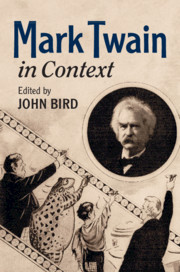Book contents
- Mark Twain in Context
- Mark Twain in Context
- Copyright page
- Contents
- Figures
- Contributors
- Preface
- Acknowledgments
- Chronology
- Abbreviations
- Part I Life
- Part II Literary Contexts
- Chapter 5 Southwestern Humor
- Chapter 6 Literary Comedians
- Chapter 7 Local Color and Regionalism
- Chapter 8 Early Periodical Writing
- Chapter 9 Travel Writing
- Chapter 10 Short Fiction
- Chapter 11 Publishing
- Chapter 12 Lectures and Speeches
- Chapter 13 Contemporary Writers
- Chapter 14 Realism and Naturalism
- Part III Historical and Cultural Contexts
- Part IV Reception and Criticism
- Part V Historical, Creative, and Cultural Legacies
- Further Reading
- Index
- References
Chapter 6 - Literary Comedians
from Part II - Literary Contexts
Published online by Cambridge University Press: 12 December 2019
- Mark Twain in Context
- Mark Twain in Context
- Copyright page
- Contents
- Figures
- Contributors
- Preface
- Acknowledgments
- Chronology
- Abbreviations
- Part I Life
- Part II Literary Contexts
- Chapter 5 Southwestern Humor
- Chapter 6 Literary Comedians
- Chapter 7 Local Color and Regionalism
- Chapter 8 Early Periodical Writing
- Chapter 9 Travel Writing
- Chapter 10 Short Fiction
- Chapter 11 Publishing
- Chapter 12 Lectures and Speeches
- Chapter 13 Contemporary Writers
- Chapter 14 Realism and Naturalism
- Part III Historical and Cultural Contexts
- Part IV Reception and Criticism
- Part V Historical, Creative, and Cultural Legacies
- Further Reading
- Index
- References
Summary
The literary comedians were a loose group of writers from the Northeast, sometimes called “Phunny Phellows” because of their use of misspelling to drive their humor. They usually wrote under pseudonyms, which were often comic and outrageous in themselves: Petroleum V. Nasby, Orpheus C. Kerr, and Artemus Ward, among others. The mask of ignorance presented by their seeming illiteracy belied a great intelligence in the writers, often with a goal of satirical political and social comment. Although Twain did not use the central device of comic misspelling in his writing, he was greatly influenced by these writers, especially Artemus Ward, who also provided for Twain a model in his lecturing career, the mask of a seemingly uneducated speaker who actually made sharp political comment.
- Type
- Chapter
- Information
- Mark Twain in Context , pp. 58 - 67Publisher: Cambridge University PressPrint publication year: 2020

